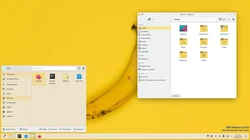news
KDE Linux Distribution Is Available for Public Testing, Download Now
I heard rumors about KDE Linux in the past, but I never thought the KDE Project would put so much effort into creating its own distro, especially since we already have KDE neon, which, in my opinion, does a tremendous job at providing the community with access to the latest and upcoming KDE software.
Unlike KDE neon, which is based on Ubuntu, KDE Linux uses packages from the Arch Linux distribution as a base, but the devs don’t consider it an Arch-based distro. It has an immutable base, but allows users to install extra packages and do some system changes by using the systemd-sysext command.
Update
Joey:
-
KDE Releases First Alpha of its New GNU/Linux Distribution
KDE has launched its own immutable GNU/Linux distribution in alpha. It acts as a 'reference implementation', offering atomic updates, Flatpak apps and more.
And more:
-
Announcing the Alpha release of KDE Linux
Today I have something very exciting to share: the Alpha release of KDE Linux, KDE’s new operating system!
Many of you may be familiar with KDE GNU/Linux already through Harald Sitter‘s 2024 Akademy talk about it (slides; recording), or the Wiki page, or its web page on kde.org.
Neowin:
-
KDE Plasma 6.5 brings a better way to handle app permissions
The KDE team has shared its weekly update, highlighting changes across the ecosystem, including a new approach to managing app permissions in Plasma.
DW:
-
Development Release: KDE Linux 20250906
Nate Graham has announced the availability of the inaugural release of KDE Linux, a general-purpose Linux distribution built by the KDE project and featuring cutting-edge KDE technologies. KDE Linux comes with an immutable base system with packages from Arch Linux, while everything else is either compiled by the kde-builder tool or included as Flatpak packages. This release is considered "alpha" quality and it comes with a development snapshot of KDE Plasma 4.5. [...]
GoL:
-
KDE officially release the first alpha of KDE Linux their new reference implementation OS
The KDE team have been busy, as they're making their own full Linux distro with KDE Linux being a reference implementation OS for Plasma and KDE apps. I did briefly touch on this in a previous GamingOnLinux article but now the Alpha is officially here.
With KDE Linux their aim is to have the absolute best implementation of KDE's software from Plasma itself to the included applications. Along with a quick update cycle to ensure you get all the latest from KDE. From the press release they're hoping this will be "the best choice for home use, enterprise workstations, research centers, public institutions, computers sold at retail, and more".
GHacks:
-
KDE Linux distro's first alpha version has been released
KDE Linux is official. The first alpha version of the new distribution has been released for testing.
For those unaware, KDE Plasma is a popular desktop environment and ships as a part of flavored distros like Kubuntu, Fedora KDE, etc. My experience with KDE is mostly limited to their apps, especially KDE Connect, Okular, Ark, and Kate. I briefly used Fedora KDE recently on a secondary "distro hopping" drive, Plasma was pretty good. There is also KDE Neon, which is maintained by the KDE Community. But this time KDE Linux is, made by KDE.
It's FOSS News:
-
KDE's Very Own Linux Distro Just Hit Alpha
KDE announced late last year that it would create its own Linux distribution. The effort builds on years of work to showcase Plasma and KDE applications in their intended form.
The result of that is KDE Linux, a new operating system developed directly by the KDE team. It arrives during a time when desktop projects are seeking greater control over their software ecosystems.
LinuxConfig:
Late coverage:
-
KDE GNU/Linux Alpha Available for Daring Users
It's official, KDE GNU/Linux has arrived, but it's not quite ready for prime time.
All-in-one post:
-
September 13 Tech news roundup: Apple launches iPhone 17, KDE Linux alpha released, Google hit by EU fine
KDE has released an alpha version of its in-house Linux distribution. It’s simply called KDE Linux. This is an immutable distro, which is built from Arch Linux packages. KDE Linux does not come with a package manager, but does support installing apps from Snap, Flatpak, AppImages. It will come with al the basic apps users may need, including Firefox, Haruna, Elisa, Kate, KWrite, Gwenview.
KDE wants to offer a user-friendly experience with a high quality interface, like Plasma. The system requirements for running KDE Linux are significantly lower than other distros like Mint. You just need 1GB of RAM, 6GB of storage, UEFI firmware and an AMD or Intel CPU, to run KDE Linux on your computer. It does not support NVIDIA GPUs older than the GTX 1630, but you can get them working with some effort.
LWN:
-
KDE launches its own distribution (again)
At Akademy 2025, the KDE Project released an alpha version of KDE Linux, a distribution built by the project to ""include the best implementation of everything KDE has to offer, using the most advanced technologies"". It is aimed at providing an operating system suitable for home use, business use, OEM installations, and more ""eventually"". For now there are many rough edges and missing features that users should be aware of before taking the plunge; but it is an interesting look at the kind of complete Linux system that KDE developers would like to see.

